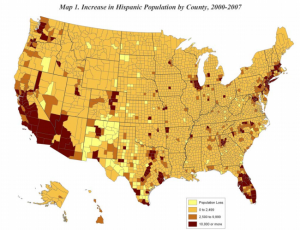Latino State Of The Union
 [Editor’s Note: The following is an edited version of a blog from LatinoPoliticsBlog.com blogger Seneca. Re-posted with permission.]
[Editor’s Note: The following is an edited version of a blog from LatinoPoliticsBlog.com blogger Seneca. Re-posted with permission.]
The “state of the union” of the Latino community appears to be one of confusion or uncertainty in what awaits it. The public discourse this year has been replete with talk of: The Latino impact at the polls; the future of immigration reform; the DREAM Act; increasing deportations; the Arizona “profiling” law; the increasing anti-immigrant and anti-Latino tone in the public discussion; the social, political and economic divisions among the Latino communities; the lack of clear leadership in the national community, the impact of the deep economic recession in terms of the menacing debt, credit and unemployment, and the way forward.
Yet not much seems to have been resolved.
Immigration, educational achievement and equal economic opportunity are the most important and pressing issues on the Latino agenda. They remain unresolved or unmitigated. The Latino socio-economic indicators reveal a huge underclass in the making. Though, some progress is also apparent: More college graduates and an increasing middle class; the vast influx of immigrants in the last three decades has raised the numbers in poverty. Educational statistics show a startling under-achievement among Latinos. Health and income conditions among Latinos are most unsettling. They continue to confront the Latino community.
Moreover, the upcoming release of the 2010 census will probably provoke a debate on the accuracy of the Latino population numbers and the statistical definitions of the overall Latino community. The Latino community’s challenges persist and often appear to become even more muddled.
This past election Latino GOP candidates achieved better results than their Democratic counterparts. As the political passing of Democrat Governor Bill Richardson occurred, with the end of his tenure, there were no Latino Democrats running for governor in any of the 50 states, yet, Republican Latino candidates for Governors were elected in Nevada with Brian Sandoval and in New Mexico with Susana Martinez.
About three new Mexican-American GOP Congressmen: Jaime Herrera of Washington State, Kiko Canseco and Bill Flores. In Idaho, another Republican, Raul Labrador, was elected to Congress (he’s Puerto Rican). The GOP also sent three Florida Cuban Americans to Congress, two were re-elected (Ileana Ross-Lehtinen and Mario Diaz Balart) and one was newly elected (David Rivera).
While Marco Rubio, the newly elected GOP Senator from Florida, restored the number of Cuban-Americans in the US Senate (2), after Mel Martinez’ departure; Senator Bob Menendez is the only Latino (Cuban-American) Democrat in the Senate. Although two Democrat Latino congressmen from Texas lost their seats (both Mexican-American) Solomon Ortiz and Ciro Rodriguez; three Democrat Puerto Ricans Congressmen were re-elected (Serrano, Velazquez and Gutierrez).
The sum of all these musical chairs further suggests that neither party has nor will have, any time soon, a solid in-run into the Latino community.
While the Democratic Party still appears to garner more Latino support over all, the question is whether this may hold solidly in the out years. The growing willingness of Latinos to vote for either party makes them most attractive to court since this vote will increasingly be “up for grabs.” Lately we have seen some GOP leaders seeking to augment their outreach to Latinos by restating their outlook on issues such as immigration reform.
The most immediate challenge to the Hispanic/Latino community is the conduct in addressing the undocumented or illegal conundrum: How do you satisfactorily resolve the status of over ten million undocumented people? The Latino community faces a formidable challenge in making the case for amnesty. An expanded Cuban Adjustment Act is not in the cards for the rest of the undocumented Latino immigrants. Getting to the front of the line is politically unacceptable. Plainly, politically, the conditions for a reasonable and just resolution are distant. Especially when while the economic conditions are bleak or at best uncertain the mantra from some quarters seems to be: Blame “the illegals.”
Obama is now weakened and is in no position to take up the Latino agenda. In sum, the national Latino leadership should be readying itself for a monumental struggle in addressing the key issues confronting the community.
Moreover, the bruising political effort to attain some rational discussion and resolution of the tangled issue of immigration will not be swift. Success or failure will serve test the Latinos’ ability to manage formidable issues.
Lastly, Latinos seem to be totally disengaged from the global agenda. When a Latino soldier’s body is brought back home from war seems to be only occasion we discuss the war and the security challenges facing the country. Security policy is virtually absent from the Latino national agenda. Hence, it seems almost premature to discuss the Latino participation in globalization or its engagement in foreign policy and trade. The way forward is indeed a true challenge.

